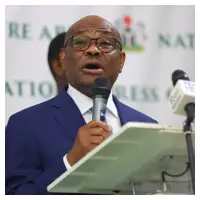Seyi Tinubu, son of President Bola Ahmed Tinubu, has established a significant philanthropic footprint across Nigeria, raising questions about the motivations behind his charitable endeavors. Are these initiatives driven by genuine compassion or calculated political positioning?
In Abuja, Tinubu donated a state-of-the-art e-library and co-working space to the Young Parliamentarians Forum. The Guardian reported that the facility features over 500 digital resources, modern workstations, and high-speed internet, potentially signaling a commitment to digital literacy and youth empowerment.
His humanitarian efforts extended to Borno State, where he donated ₦500 million to flood-ravaged communities in December 2023. According to Vanguard, the contribution was described as "timely and lifesaving," helping to resettle displaced families and rebuild critical infrastructure.
During Ramadan, Tinubu hosted iftar dinners in Kano and Kaduna, bringing together traditional rulers, youth leaders, and clerics. ThisDay reported these gatherings were designed to foster unity and dialogue across Nigeria's diverse communities.
Health and Sports Initiatives
In Ibadan, Tinubu funded a maternal and child health drug bank at the University College Hospital, providing essential medications to vulnerable women and children. Leadership newspaper reported this initiative aims to reduce maternal and infant mortality rates.
His sports programs include the Seyi Tinubu Basketball Championship in Jos, which attracted over 1,200 young players from across the North Central region, and a Table Tennis Challenge in Lagos that provided opportunities for youth from underserved communities.
On International Youth Day 2024, the Noella Foundation, co-founded with his wife Layal Tinubu, pledged to create over 10,000 jobs through skill acquisition programs, startup incubation, and strategic partnerships, according to Punch.
Alignment with Government Agenda
These philanthropic efforts mirror President Tinubu's Renewed Hope Agenda, which emphasizes poverty reduction, job creation, and inclusive growth. The administration has launched several complementary initiatives, including the National Talent Export Programme (NATEP), the ₦620 million Investment in Digital and Creative Enterprises (iDICE) initiative, the Nigerian Education Loan Fund (NELFUND), and the National Agricultural Development Fund.
The Seyi Tinubu Grassroots Support Initiative offers scholarships for indigent students, free healthcare for rural dwellers, and business grants for micro-entrepreneurs. Leadership newspaper also reported on his national drug bank initiative, which aims to deliver essential medication to 10,000 patients across 60 hospitals nationwide.
Mixed Public Reactions
Public response to Tinubu's philanthropy has been divided. The Alliance for Better Nigeria described him as a "special gift to the nation," while youth advocate Comrade Musa Ibrahim praised his use of private rather than public funds. Rt. Hon. Ukkasha Hamza Rahama of the APC Youths Progressive Forum called him "a genuine youth advocate."
Critics, however, suggest his generosity may be a branding exercise designed to pave the way for future political ambitions, or dismiss it as elite philanthropy insufficient to address Nigeria's structural problems.
Regardless of motivation, the tangible impact of these initiatives is evident across Nigeria's geopolitical zones. From Borno to Oyo, from Abuja to Jos, Tinubu's efforts are touching lives in communities that often feel neglected by the political elite.
Whether these philanthropic activities signal political ambitions remains to be seen. What is clear is that Seyi Tinubu is actively engaged in addressing some of Nigeria's most pressing challenges, complementing the broader national development agenda championed by his father's administration.













